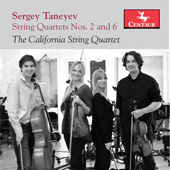

Sergey Taneyev (1856-1915) certainly stands as the odd man out against the backdrop of Russian music around the beginning of the 20th century. His teacher was Tchaikovsky,
and some of his own students included Rachmaninov and Scriabin, but his music sounds like neither of them. The slightest hints of another Russian composer from around that time that I can
perceive within his music resemble Glazunov. Taneyev's writing was guided by intellect rather than emotion. He was an amateur scientist and mathematician, and believed that composition should
be driven by form and logic, and that solid counterpoint, rather than melodic or thematic development, should be its foundation. In that sense he was closer to the German school of musical
development, fusing Bach and Brahms together. No fairy tale ballets or surreal flights of the imagination can be found within his opus, but oddly enough he apparently was blessed with a mean
sense of humor.
Having said all that, most of his music is not as "dry and laboured in character" as Rimsky-Korsakov once pointed out, but then he was setting down music about sultans, demons and shipwrecks,
and not straight-laced chamber music and symphonies. For example, the opening movement of the String Quartet No. 2, Op.5, despite projecting an overall
melancholic undertone, is constantly driven forward by a rhythmic momentum tossed around from player to player, each one getting a turn at holding up the melodic torch, with a wide spread from
top to bottom. The second movement scherzo starts and ends with what sounds like an urgent train ride, with a warm and lyrical segment at its core. The Adagio espressivo movement
is where I discern more clearly Taneyev's Russian character, and hear bits of Glazunov's influence. Taneyev wrote extensively on the theoretical aspect of music and felt that the new
music of the day was heading in the wrong harmonic direction and needed traditional olde worlde methods to straighten it out. Nowhere is that becoming more apparent than in the more mature
String Quartet No. 6, Op. 19. In particular the Adagio serioso movement wherein, aside from a short and tender interlude, is almost entirely built
upon a strict Bachian counterpoint. Nothing wrong with that at all except that it was completely countercurrent to the direction music was taking in 1905. And despite all this, the final movement
caps the quartet with an unbridled sense of joy.
The California String Quartet was established in 2002 by members of the Los Angeles Chamber Orchestra, an ensemble credited with many outstanding recordings on a variety
of fine labels. Katia Popov (violin), and new members Luanne Homzy (violin), Zach Dellinger (viola) and Benjamin Lash
(cello), although busy commissioning composers to write a new work for every concert, have truly slipped into Taneyev's persona for this recording and manage to expose the composer's deepest
emotional anima, overshadowing his theoretical reasoning. The rhapsodic and expressive cello of Benjamin Lash combined with the emotive phrasing of Katia Popov's violin remove all doubts
about this composer's lack of "musical" and "expressive" capabilities. The sound quality is excellent with all four instruments staged properly and precisely balanced. There aren't many recordings
available right now for these quartets, so it's very likely for this one to have set the bar higher.
Jean-Yves Duperron - September 2017